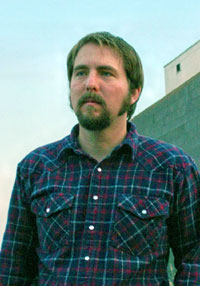Poems by
Joe Wilkins
Poetry chapbook, 40 pages, cover price $7
ISBN: 978-1-59948-050-3
Release date: 2006
***This title was selected for publication as a result of finishing as a runner up in the 2006 MSR Chapbook Contest.***
$7.00
Poetry chapbook, 40 pages, cover price $7
ISBN: 978-1-59948-050-3
***This title was selected for publication as a result of finishing as a runner up in the 2006 MSR Chapbook Contest.***
 Joe Wilkins was born and raised on a sheep ranch north of the Bull Mountains in eastern Montana. After finishing at the local public school, he left Montana to attend Gonzaga University where he earned a bachelor of science in engineering. He subsequently spent two years teaching ninth grade algebra in the Mississippi Delta, and now teaches and writes in Moscow, Idaho. His poems, essays, and stories have appeared in The Georgia Review, Northwest Review, Best New Poets 2006, among other literary journals.
Joe Wilkins was born and raised on a sheep ranch north of the Bull Mountains in eastern Montana. After finishing at the local public school, he left Montana to attend Gonzaga University where he earned a bachelor of science in engineering. He subsequently spent two years teaching ninth grade algebra in the Mississippi Delta, and now teaches and writes in Moscow, Idaho. His poems, essays, and stories have appeared in The Georgia Review, Northwest Review, Best New Poets 2006, among other literary journals.
The Murder of Lily Shaw
An owl called, the knife blade met
the wood, and it was done.
After they left, we gathered her
and carried her through miles
of moonlight towards the old house
on the river. Owls followed
on their silent wings. They came
to carry her soul over the river
and into the dark trees.
Letter to Paul from Sunflower
It’s hot here. The air is heavy.
August has been a long scream of cicadas.
The Big Sunflower River runs swollen
and brown. In a whisper of wet fog, blackbirds
spray from my pickup, and off old Highway 49
rice and cotton give way to strangles of trees
along the bayous. They say the topsoil is hundreds
of feet thick—the rot of a continent washed over
and over again. Even the sun, just a gray ring
in grayer sky, is choked in it all. And yesterday
I saw a thousand white cranes smother
a stand of dying cypress like snow.
I stay in a small brick house on the white
side of Sunflower. My neighbors smile,
bring me big plates of okra casserole
and invitations to drink sweet tea on their porch.
I smile, thank them for their hospitality, and walk
across the tracks, to the school where I teach.
My students are kids like any others,
but they’re also poor and black and beaten
down everyday by the blows of the dead,
and of the living. I like to think I’m doing
something about this, but then I cash my check
and make my way back across the tracks.
You can buy a watermelon at Lewis’s Grocery
for a dollar. The big woman says, Now, you pick
you a sweet one. If it ain’t sweet, you bring it back
and get you a sweet one, you hear? I pick
a sweet one. Children clatter across the rot-wood
porches of shotgun shacks, and the men down
King Avenue hold paper bags close to their hearts
and stare. There’s a grandmother with one eye
who talks to stray dogs—this place is deep
with ghosts. Do you remember that Sunday,
driving Montana? Just the two of us, tall grass
and sky? Brother, you are far away,
and America is so suddenly old.
Seasons in South Memphis
The floods are a bloom of stagnant water, heavy stink
of wisteria. Men gather at the corner of Tchulahoma
and Raines. They smoke, shift on their feet, wonder
if they’ll find work in the soybeans this spring.
Summer fires through the air, and a young girl
rides the 61 bus up from some muddy Delta town.
This is the city, blazing Memphis, and come sunset
she’ll whisper through the shadows of the street.
Al culls slow sellers at the Discount Liquor
in September. He grabs a bottle by its dusty
neck, pulls hard, and tosses the rest out back,
shattered glass like a slick of diamonds.
The lunatics line up outside the old public library,
their beards heavy with last night’s freeze. The city
passed an ordinance years back, but it’s cold—stone
and sky the same incessant gray—and no one cares.